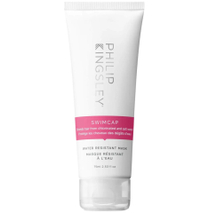How to protect your hair from chlorine so you can swim without worrying about damage
Experts share their top hair care tips for how to protect your hair from chlorine before, during and after a swim
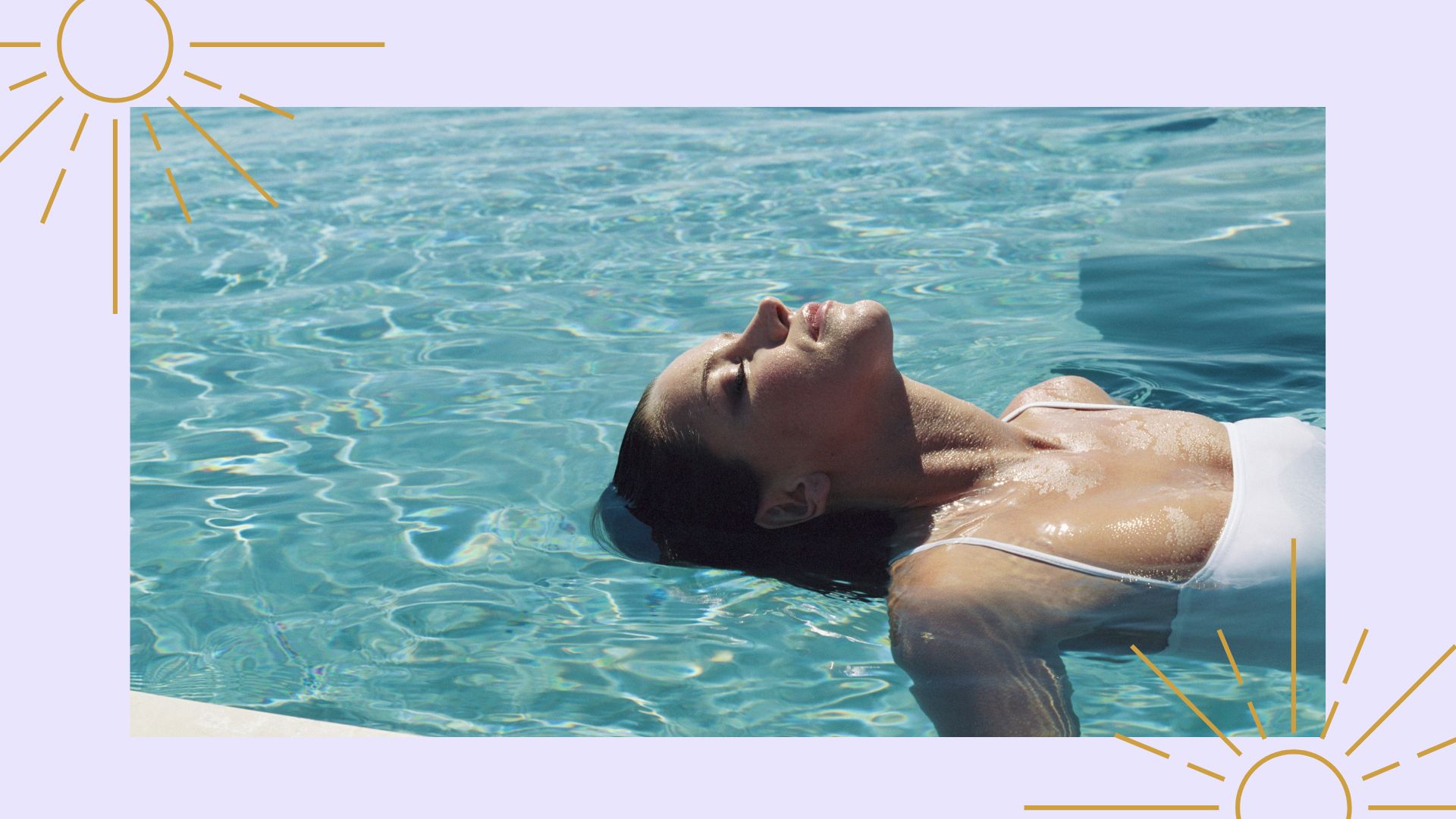

The side effects of chlorine on dyed hair are widely known but actually chlorine in swimming pools can affect all hair types and so knowing how to protect your hair from chlorine, especially if you plan on swimming everyday or frequently, is important for maintaining your overall hair health.
"The concentration of chlorine in a swimming pool removes the natural oils on your hair which can result in dry, brittle hair and also make your hair prone to split ends," Aveda Senior Creative Director, Michael Lendon, explained to woman&home.
“Prolonged chlorine exposure makes the hair prone to static and frizz, resulting in dull, dry, and brittle-looking strands,” Karlee Ozener, Founder of Hello Klean, tells us. "Chlorine is a threat to blonde hair (natural or bottle blondes) because chlorine and copper can bond to form a film that sticks to the proteins in each strand of hair. During the oxidization process, this can cause lighter hair to turn green."
Although this might sound off-putting, you don't need to avoid swimming pools indefinitely if you want to keep your hair healthy and looking its best. Just as you can reverse the effects of hard water on your hair or buy heat protection sprays to save your locks from the side effects of using hair tools, there are also ways to protect your hair from chlorine. Here, hair experts share their top haircare tips with woman&home on how to protect your hair from chlorine so you can keep on swimming without the stress.
How to protect your hair from chlorine to keep it looking and feeling healthy
1. Pre-soak your hair before a swim
Giving your hair a good soaking of fresh water before jumping into a chlorinated pool is one of the easiest and quickest ways to reduce the amount of chemicals your hair soaks up while you're swimming.
“Before entering the pool, pre-soak your hair with clean (non-chlorinated) tap water. Your strands absorb the clean water, which minimizes the amount of chlorine that will be absorbed.” Ozener explains.
2. Use a protective product
Applying a protective product to your hair before getting in a pool can help shield it from the drying and damaging effects of chlorine. There are specific hair products you can buy to protect your hair from chlorine, or you can use natural oils.
Sign up to our free daily email for the latest royal and entertainment news, interesting opinion, expert advice on styling and beauty trends, and no-nonsense guides to the health and wellness questions you want answered.
Ozener suggests, “Use a leave-in chlorine protectant if you're a frequent swimmer or have high-porosity hair. Natural oils, including coconut oil, olive oil, and jojoba, act as a protective layer to prevent chemicals from absorbing into your hair strands. For added protection, apply a deep conditioning mask or leave-in conditioner."
Philip Kingsley Swimcap Water Resistant Mask | RRP: $30/£19.50
Anabel Kingsley, Brand President and Consultant Trichologist at Philip Kingsley, naturally, recommends the Philip Kingsley Swimcap Water Resistant Mask to protect your hair from chlorine, "It’s water-resistant and, in addition, it can help prevent chlorine from turning color-treated hair green. It also contains UV absorbers to protect against damaging UV rays but will protect hair against the effects of chlorine and salt water due to the high oil content which is water repelling.”
3. Wear a swimming cap
We know they aren't the most comfortable of accessories but a swim cap really is one of the best ways to protect your hair from chlorine damage. They act as a protective barrier between your tresses and the pool water and will ultimately prevent any water from getting near your hair.
Ozener sings their praises, “Swim caps are great for preventing chlorine from reaching your hair in the first place. If you have long hair and don't have a swim cap, tie your hair back in a tight hair up style like a bun to minimise contact with chlorine.”
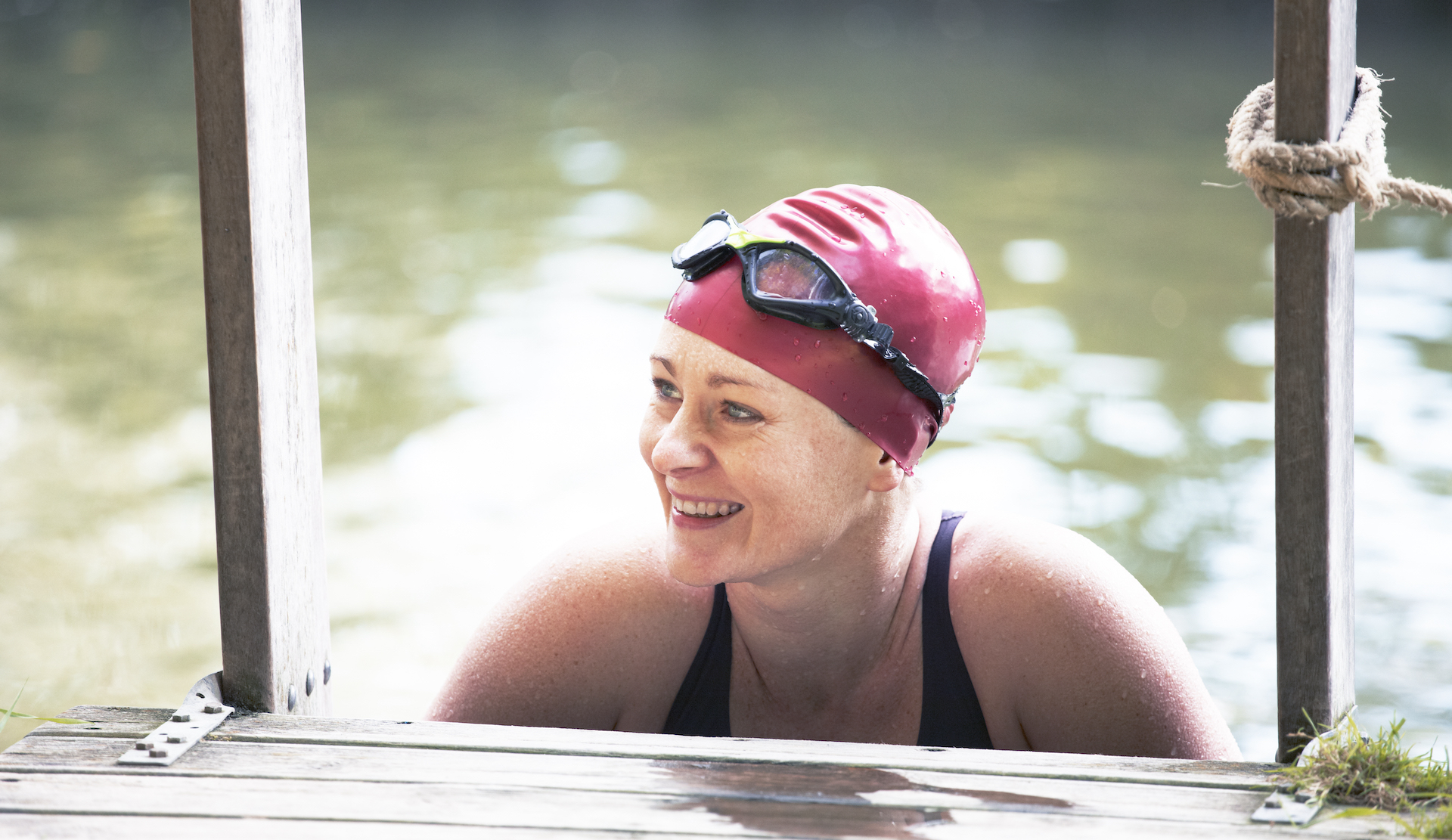
4. Re-think how you wear your hair in the pool
If you really can't bring yourself to don a swim cap around the pool, then re-think how you style your hair before a swim.
"Loosely plait and tie your hair up to avoid your hair from getting wet in the pool (if you’re an upright swimmer!)"Lendon suggests. "Plaiting your hair will also help it to not get damaged from abrasion when doing activities - rather than leaving it loose or potentially damaging it by tying with an elastic."
He continues, "Try a hairstyle in the morning that will last all day and help protect your hair. Before you hit the beach or pool, do some plaits with a lightweight hair treatment or normal conditioner in it so your hair is tucked up and protected all day- then wash out later before your evening of fun. Holidays are a great way to focus on hair health and you could even return home with healthier hair than you left with!"
5. Wash your hair immediately after swimming
If you do go for a swim, it's important that you rinse your hair in clean (non-chlorinated) tap water as soon as you can after getting out of the pool to protect it from chlorine side effects.
“Chlorinated water doesn't just do damage while you're swimming, by not rinsing it out, the chemicals in the pool can sit in your hair and scalp and contribute to dryness, irritation, and brittle hair prone to breakage," warns Ozener. "Rinse your hair thoroughly with clean water, wash with a clarifying treatment, and follow with a sulfate-free shampoo.”
Kingsley also echoes this advice. “Ideally, wash the hair straight away after coming out of the pool. On holiday, of course, you’ll be spending more time dipping in and out, so try and rinse the hair at the outdoor shower after each dip if possible.”
See our guide on how to get chlorine out of hair for top tips from our Beauty Editor on rinsing your hair effectively after swimming.
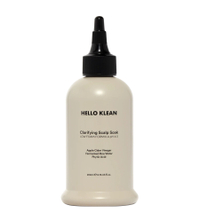
Hello Klean Clarifying Scalp Soak | RRP:$28/£25
Treat your scalp to a clarifying soak with the help of this exfoliating apple cider vinegar solution. Pop onto your scalp after a day in the pool to help remove any leftover traces of chlorine and to also clear product build up, dirt and grime.
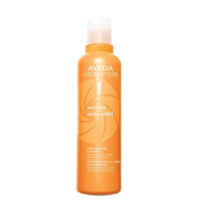
Aveda Sun Care Hair and Body Cleanser | RRP:$29/£23.50
Lendon recommends using Aveda Hair and Body Cleanser as it's, "designed to be used on your hair to remove salt and chlorine, but also on your body for the same benefit. It really helps to remove the chemical smell from your skin and hair, and reduces the amount of products your need to pack!"
6. Re-hydrate your hair
Anabel Kingsley suggests, “reaching for deep conditioning treatments and hydrating products that will restore moisture. Always shampoo the hair after swimming in chlorinated pools and use a regular strengthening and hydrating hair mask. Using a clarifying treatment from time to time can help to remove build-up from the hair.”
“Look for ingredients such as apple cider vinegar, gently rinsing away the impurities without stripping moisture," recommends Ozener.
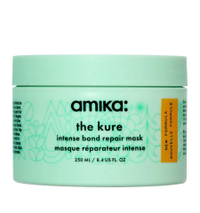
Amika The Kure Intense Bond Repair Mask | RRP: $40/£35
Promising to work hard to repair hair damage and deeply hydrate, this intensive hair mask is so worth investing in. Slather some all over after a day in the pool to help restore lost moisture and softness to strands. It also helps prevent future damage too.
7. Avoid using heated tools
If your hair has been exposed to chlorine, especially if you've been on holiday and swimming every day, then it's time to give it a break from heat styling to let it fully recover and regain strength. "Let your hair completely air dry while you get changed, and limit the use of heat styling tools," recommends Ozener.
In order to give it the break it deserves, let your holiday hair air dry and leave your hair dryer or GHD straighteners alone for a while. Load up on nourishing hair masks and strengthening treatments, in addition to air dry creams to nourish and protect.
Another thing you can do to protect your hair after exposure to chlorine is to, “brush gently and remove tangles with a detangling brush designed for wet hair,” suggests Ozener. This is because your hair is so much more fragile when it's wet.
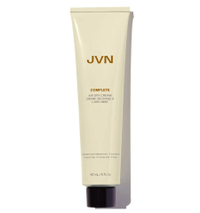
JVN Complete Air Dry Cream | RRP: $26/£23
Ideal for those who don't heat style or dry their hair or if you're taking a break from the tools, this hair cream works to enhance natural texture, give soft hold, shine and natural softness. Plus, it's packed with nourishing oils too.

Annie Milroy is the Beauty Writer for Woman & Home and other publications.
She spent three years studying Journalism and English Language at the University of Portsmouth before starting her career in magazines in 2017. After 8 years in the beauty industry, she's grown very fond of any product that can give her that 'my skin but better' finish, and anything that hydrates her seemingly always parched face.
When she’s not working, she’s shamelessly watching back-to-back Real Housewives episodes, spending all her time with her beloved yellow Lab, Freya, and hunting down the best carb spots London has to offer.
